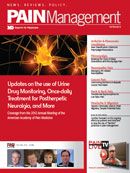Publication
Article
Pain Management
Neuropathies Are a Common Cause of Pain in Patients with HIV, but Are Effective Pharmacologic Treatments Available?
Many first-line agents shown to be effective in treating neuropathic pain in other settings are ineffective in managing HIV-related neuropathies.
Neuropathy is a frequent cause of pain in patients with human immunodeficiency virus (HIV), and can be attributable to the effects of HIV itself, as well as to some of the antiretroviral therapies used to treat it. The authors of “Painful HIV-associated Neuropathy” (http://bit.ly/zOEJxZ), a clinical update published by the IASP, noted that the rates for neuropathies in patients with HIV “have been rising since the first effective antiretroviral drugs were developed.” One study they cited placed prevalence of sensory neuropathies in patients on antiretroviral therapies as high as 50%.
A recent literature review of the incidence and prevalence of HIV-related neuropathy among various patient populations found “great variation in results across studies,” including a wide range in prevalence across populations (from 1.2% to 69.4%) and in rates per 100 person-years (from 0.7 to 39.7). The authors reported that older patients and those with more severe disease faced increased risk of developing neuropathies. They noted that current studies “suggest a significant burden” for the condition, and that the “great variation in results” seen across studies on the incidence and prevalence of HIV-related neuropathy “underscores the fact that complexity of the disease, along with absence of standardized diagnostic criteria, has considerably influenced the methodologies and outcomes of the studies” (http://bit.ly/w7LnOj).
FDA Advisory Committee Votes against Recommending Approval of Capsaicin Patch for HIV-related Peripheral Neuropathy
During a meeting held February 9, 2012, the 12 members of the FDA Anesthetic and Analgesic Drug Products Advisory Committee (AADPAC) discussed whether the available clinical evidence showed that the Qutenza (capsaicin) 8% patch was effective in the management of painful HIVassociated peripheral neuropathy. Following a review of the data and discussion, the committee members voted on two questions (http://1.usa.gov/xbqYu5):
- Do the data from clinical trials provide substantial evidence of effectiveness of Qutenza for the management of painful HIV-associated peripheral neuropathy?
- Is the risk-benefit profile acceptable for Qutenza to be approved for this indication?
The members of the AADPAC unanimously voted “No” in answer to the first question, and voted nearly unanimously “No” (11 members voted “No” and one member abstained) in answer to the second question.
Given the potentially high frequency of HIV-related neuropathy in this population, the availability of effective treatments is an important concern for patients and providers. Unfortunately, “few pharmacological therapies are supported by robust evidence,” according to the authors of the IASP review. Even medications such as pregabalin and gabapentin that have been shown to be effective in treating other forms of neuropathic pain have not been shown in clinical trials to be superior to placebo in managing HIV-related neuropathy. The authors of “Pharmacological Treatment of Painful HIV-Associated Sensory Neuropathy: A Systematic Review and Meta-analysis of Randomized Controlled Trials” (http://bit.ly/xu1mno) conducted a literature review to identify quality randomized controlled trials investigating the pharmacological treatment of painful HIV-related neuropathy. They found that no superiority over placebo was reported in trials that evaluated amitriptyline, gabapentin, pregabalin, prosaptide, peptide-T, acetyl- L-carnitine, mexilitine, lamotrigine, and topical capsaicin.
A review of the literature summarized in “Treatment Considerations in Painful HIV-related Neuropathy” noted that HIV-related sensory neuropathy “appears to be particularly resistant to pharmacologic treatment, and multiple agents that are normally found to be useful in other peripheral neuropathic pain conditions are generally disappointing” in the treatment of HIV-related painful sensory neuropathy (http://bit.ly/x4eyXZ). Opioids may not be any more effective in achieving analgesia in this patient population, as their use “may actually facilitate pronociceptive processes involved in contributing to” HIV-related neuropathy and “may potentially contribute to ‘fueling the fire’ of HIV enhanced pain hypersensitivity.”
These and similar findings underscore the need for further study and development of effective treatments for painful HIV-related neuropathies.
